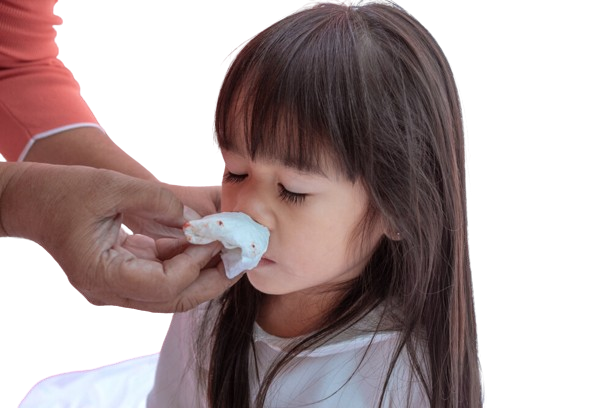Nose Bleeding Expert in Perumbakkam
Your Trusted Partner in Nose Bleeding
Epistaxis, or a nosebleed, is when you lose blood from the tissue that lines the inside of your nose. We are here to provide you with top-notch care and guidance to tackle your problems.

Understanding Nose Bleeding
Causes of Nose Bleeding
- Direct injury: A blow to the face may damage the lining of a person’s nose, which can cause bleeding.
- Irritation: Frequent picking or blowing of the nose can make its lining more likely to bleed.
- Foreign bodies: Foreign bodies in the nasal cavity can disturb local tissue and blood vessels.
- Air travel and altitude: Changes in altitude and air pressure can cause nasal blood vessels to expand and contract. These disturbances can lead to nosebleeds.
- Inflammation: Inflammation due to allergies or infections, such as sinutis, can damage blood vessels in the nose.
- Humidity: Climates with low humidity can cause cracking in nasal tissue. This in turn can lead to bleeding.
- Liver disease: Liver disease can interfere with blood clotting and result in frequent or severe nosebleeds.
- Medications: The use of blood thinners or nonsteroidal anti-inflammatory can cause nosebleeds. Nasal steroid medications can also dry the nasal lining, increasing the risk of a nosebleed.
- Illegal drugs: The use of cocaine or other nasally ingested drugs can disturb the nasal lining and cause bleeding.
- Irritants: Exposure to smoke or irritant fumes can damage the nasal lining and cause nosebleeds.
- Radiation therapy and chemotherapy: Chemotherapy can lower the number of platelets in the blood. This makes blood clotting more difficult, and bleeding more common.
Symptoms
The main symptom of a nosebleed is blood coming from the nose. This bleeding can vary in severity and can come out of one or both nostrils. Posterior nosebleeds are more likely trusted source to cause bleeding in both nostrils.
If the nosebleed occurs while a person is lying down, they will typically feel liquid in the back of the throat before the blood comes from the nose.
Other causes of nosebleeds
In some cases, underlying health conditions and less common occurrences can result in nosebleeds. These include:
- conditions affecting blood vessels, such as hereditary hemorrhagic telangiectasia
- nasal surgery
- calcium deficiency
- blood diseases, such as hemophilia and leukimia
- some tumors
Prevention
There are several things a person can do to prevent the onset of nosebleeds, such as:
- Avoiding picking the nose
- Avoiding blowing the nose too hard or too frequently
- Avoiding exertion or strenuous activity after nosebleeds
- Avoiding irritants and drying nasal medications
- Having the mouth open when sneezing
Keeping the lining of the nose moist can help prevent nosebleeds. For example, using nasal saline sprays and humidifiers at high altitudes or in dry climates may be of benefit to some people.
Treatments
Frequently Asked Question on Nose Bleeding
Nosebleeds are often more common in dry climates and during the winter months when the air tends to be drier.
To stop a nosebleed, pinch the nostrils together and lean forward slightly. Applying a cold compress to the bridge of the nose can also help.
Yes, medications that thin the blood, such as anticoagulants and antiplatelet drugs, may contribute to nosebleeds.
Using a humidifier, applying saline nasal spray, and staying well-hydrated can help prevent nosebleeds in dry conditions.
While high blood pressure itself may not directly cause nosebleeds, it can be a contributing factor in certain situations.
